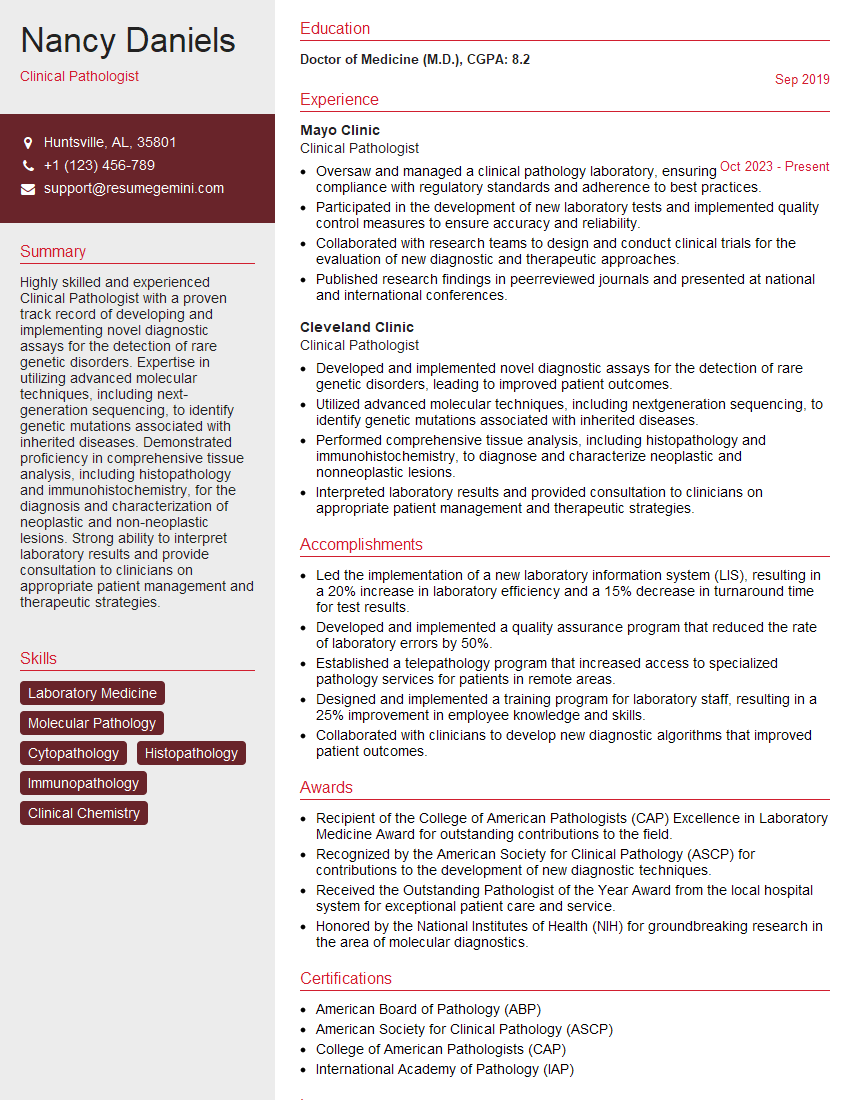Are you a seasoned Clinical Pathologist seeking a new career path? Discover our professionally built Clinical Pathologist Resume Template. This time-saving tool provides a solid foundation for your job search. Simply click “Edit Resume” to customize it with your unique experiences and achievements. Customize fonts and colors to match your personal style and increase your chances of landing your dream job. Explore more Resume Templates for additional options.

Nancy Daniels
Clinical Pathologist
Summary
Highly skilled and experienced Clinical Pathologist with a proven track record of developing and implementing novel diagnostic assays for the detection of rare genetic disorders. Expertise in utilizing advanced molecular techniques, including next-generation sequencing, to identify genetic mutations associated with inherited diseases. Demonstrated proficiency in comprehensive tissue analysis, including histopathology and immunohistochemistry, for the diagnosis and characterization of neoplastic and non-neoplastic lesions. Strong ability to interpret laboratory results and provide consultation to clinicians on appropriate patient management and therapeutic strategies.
Education
Doctor of Medicine (M.D.)
September 2019
Skills
- Laboratory Medicine
- Molecular Pathology
- Cytopathology
- Histopathology
- Immunopathology
- Clinical Chemistry
Work Experience
Clinical Pathologist
- Oversaw and managed a clinical pathology laboratory, ensuring compliance with regulatory standards and adherence to best practices.
- Participated in the development of new laboratory tests and implemented quality control measures to ensure accuracy and reliability.
- Collaborated with research teams to design and conduct clinical trials for the evaluation of new diagnostic and therapeutic approaches.
- Published research findings in peerreviewed journals and presented at national and international conferences.
Clinical Pathologist
- Developed and implemented novel diagnostic assays for the detection of rare genetic disorders, leading to improved patient outcomes.
- Utilized advanced molecular techniques, including nextgeneration sequencing, to identify genetic mutations associated with inherited diseases.
- Performed comprehensive tissue analysis, including histopathology and immunohistochemistry, to diagnose and characterize neoplastic and nonneoplastic lesions.
- Interpreted laboratory results and provided consultation to clinicians on appropriate patient management and therapeutic strategies.
Accomplishments
- Led the implementation of a new laboratory information system (LIS), resulting in a 20% increase in laboratory efficiency and a 15% decrease in turnaround time for test results.
- Developed and implemented a quality assurance program that reduced the rate of laboratory errors by 50%.
- Established a telepathology program that increased access to specialized pathology services for patients in remote areas.
- Designed and implemented a training program for laboratory staff, resulting in a 25% improvement in employee knowledge and skills.
- Collaborated with clinicians to develop new diagnostic algorithms that improved patient outcomes.
Awards
- Recipient of the College of American Pathologists (CAP) Excellence in Laboratory Medicine Award for outstanding contributions to the field.
- Recognized by the American Society for Clinical Pathology (ASCP) for contributions to the development of new diagnostic techniques.
- Received the Outstanding Pathologist of the Year Award from the local hospital system for exceptional patient care and service.
- Honored by the National Institutes of Health (NIH) for groundbreaking research in the area of molecular diagnostics.
Certificates
- American Board of Pathology (ABP)
- American Society for Clinical Pathology (ASCP)
- College of American Pathologists (CAP)
- International Academy of Pathology (IAP)
Career Expert Tips:
- Select the ideal resume template to showcase your professional experience effectively.
- Master the art of resume writing to highlight your unique qualifications and achievements.
- Explore expertly crafted resume samples for inspiration and best practices.
- Build your best resume for free this new year with ResumeGemini. Enjoy exclusive discounts on ATS optimized resume templates.
How To Write Resume For Clinical Pathologist
- Highlight your experience in developing and implementing novel diagnostic assays.
- Showcase your expertise in utilizing advanced molecular techniques, such as next-generation sequencing.
- Emphasize your skills in comprehensive tissue analysis, including histopathology and immunohistochemistry.
- Demonstrate your ability to interpret laboratory results and provide consultation to clinicians.
Essential Experience Highlights for a Strong Clinical Pathologist Resume
- Develop and implement novel diagnostic assays for the detection of rare genetic disorders.
- Utilize advanced molecular techniques, including next-generation sequencing, to identify genetic mutations associated with inherited diseases.
- Perform comprehensive tissue analysis, including histopathology and immunohistochemistry, to diagnose and characterize neoplastic and non-neoplastic lesions.
- Interpret laboratory results and provide consultation to clinicians on appropriate patient management and therapeutic strategies.
- Oversee and manage a clinical pathology laboratory, ensuring compliance with regulatory standards and adherence to best practices.
- Participate in the development of new laboratory tests and implement quality control measures to ensure accuracy and reliability.
- Collaborate with research teams to design and conduct clinical trials for the evaluation of new diagnostic and therapeutic approaches.
Frequently Asked Questions (FAQ’s) For Clinical Pathologist
What is the role of a Clinical Pathologist?
Clinical Pathologists play a vital role in the diagnosis and treatment of diseases by examining tissues, cells, and body fluids.
What are the educational requirements to become a Clinical Pathologist?
To become a Clinical Pathologist, you must typically complete a Doctor of Medicine (M.D.) degree followed by residency training in pathology.
What are the career opportunities for Clinical Pathologists?
Clinical Pathologists can work in a variety of settings, including hospitals, clinics, and research institutions.
What are the challenges faced by Clinical Pathologists?
Clinical Pathologists face challenges such as the need to keep up with advances in medical technology and the increasing complexity of patient cases.
What are the rewards of being a Clinical Pathologist?
Clinical Pathologists enjoy the rewards of making a significant contribution to the healthcare of their patients.
What are the qualities of a successful Clinical Pathologist?
Successful Clinical Pathologists have strong analytical skills, attention to detail, and a commitment to excellence.